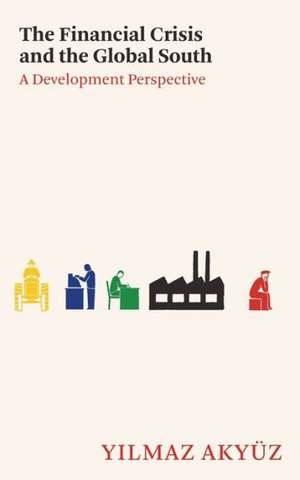The Financial Crisis and the Global South: A Development Perspective
Autor Yilmaz Akyuzen Limba Engleză Paperback – 4 apr 2013
Written by a highly respected development economist, the book gives a clear-eyed account of the issues particular to these countries and critically evaluates different policy approaches, including reforms in financial, monetary and trade policies. Informed by deep scholarship as well as practical experience, Yilmaz Akyüz draws on empirical data, historical context and theoretical expertise, with special attention paid to issues such as the role of the International Monetary Fund and China.
The Financial Crisis and the Global South is a landmark book that will be of interest to practitioners, scholars, theorists and students of economics and development studies.
Preț: 255.79 lei
Nou
Puncte Express: 384
Preț estimativ în valută:
48.95€ • 53.33$ • 41.24£
48.95€ • 53.33$ • 41.24£
Carte tipărită la comandă
Livrare economică 23 aprilie-07 mai
Preluare comenzi: 021 569.72.76
Specificații
ISBN-13: 9780745333625
ISBN-10: 0745333621
Pagini: 208
Ilustrații: black & white line drawings, black & white tables, charts
Dimensiuni: 150 x 230 x 13 mm
Greutate: 0.34 kg
Editura: PLUTO PRESS
Colecția Pluto Press
ISBN-10: 0745333621
Pagini: 208
Ilustrații: black & white line drawings, black & white tables, charts
Dimensiuni: 150 x 230 x 13 mm
Greutate: 0.34 kg
Editura: PLUTO PRESS
Colecția Pluto Press
Notă biografică
Yilmaz Akyüz is Chief Economist at the South Centre and Former Director and Chief Economist of the United Nations Conference on Trade and Development. He is the editor of Developing Countries and World Trade (2003) and Reforming the Global Financial Architecture (2001).
Cuprins
Introduction
1. Policy Response to the Global Financial Crisis: Key Issues for Developing Countries
2. Global Economic Prospects: The Recession May Be Over But Where Next?
3. Export Dependence, Sustainability of Growth and Adjustment in China
4. The Subprime Boom-Bust Cycle and Capital Flows to Developing Countries
5. Why the IMF and the International Monetary System Need More Than Cosmetic Reform
Conclusions
References
1. Policy Response to the Global Financial Crisis: Key Issues for Developing Countries
2. Global Economic Prospects: The Recession May Be Over But Where Next?
3. Export Dependence, Sustainability of Growth and Adjustment in China
4. The Subprime Boom-Bust Cycle and Capital Flows to Developing Countries
5. Why the IMF and the International Monetary System Need More Than Cosmetic Reform
Conclusions
References














